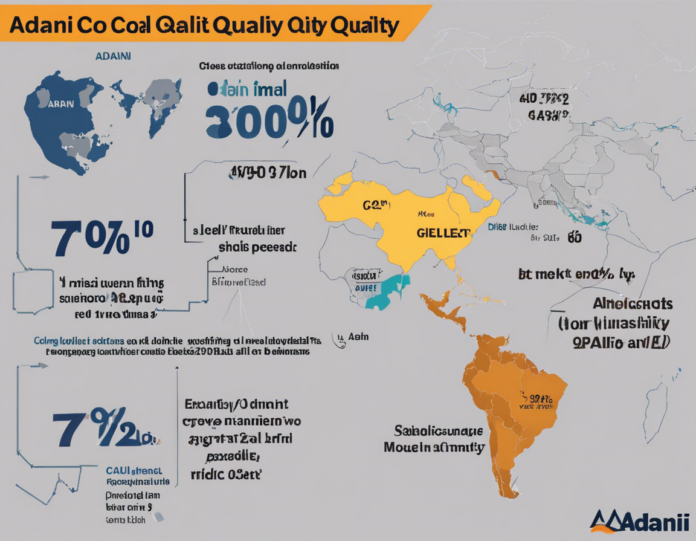Introduction
The Adani Group is a conglomerate of companies headquartered in Ahmedabad, India, with diverse business interests in logistics, energy, infrastructure, and agriculture. One of its most controversial ventures is in the coal industry, with various coal mines and associated projects globally.
Types of Adani Coal
The Adani Group predominantly deals in thermal coal, which is used for electricity generation. Adani’s coal mines are located in regions like Australia, India, and Indonesia. The quality of coal extracted from these mines varies based on factors such as ash content, calorific value, moisture content, and sulfur content.
Quality of Adani Coal
-
Ash Content: Coal with higher ash content requires more energy to burn and produces more waste. Adani’s coal typically has ash content ranging from 10% to 20%, depending on the specific mine.
-
Calorific Value: This is the amount of heat produced by the combustion of coal. Adani’s coal generally has a calorific value of around 4000 to 6000 kcal/kg.
-
Moisture Content: Moisture in coal affects its handling and storage, as well as its combustion efficiency. Adani’s coal can have moisture content ranging from 5% to 15%.
-
Sulfur Content: High sulfur content in coal leads to sulfur dioxide emissions, contributing to air pollution. Adani coal has sulfur content typically below 1%, which is considered relatively low.
-
Particle Size: The size of coal particles affects combustion efficiency. Adani coal is usually crushed to a size suitable for efficient burning in power plants.
-
Compliance with Regulations: Adani coal mines operate within the regulatory framework of the countries they are located in. They are expected to meet environmental standards, including emission limits and reclamation requirements.
Environmental Impact
The mining and burning of coal have significant environmental implications, such as air and water pollution, land degradation, and contribution to climate change through greenhouse gas emissions. Adani’s coal projects have faced criticism and opposition from environmental groups and local communities concerned about the impact on biodiversity, water resources, and public health.
Social Implications
Coal mining operations can also have social repercussions, including displacement of communities, conflict over land rights, and health issues due to pollution. Adani’s projects have been the subject of social activism and legal disputes related to indigenous rights and labor conditions.
Investment and Market Trends
Despite the controversies surrounding Adani’s coal projects, the company has attracted significant investment from domestic and international sources. The global demand for coal continues to be strong, particularly in emerging economies reliant on coal for power generation.
Future Outlook
The future of Adani’s coal business is influenced by factors such as government policies on coal use, technological advancements in clean energy, and public opinion on fossil fuels. Adani and other coal companies are under pressure to transition to cleaner energy sources in line with global efforts to combat climate change.
Frequently Asked Questions (FAQs)
- What is the calorific value of Adani coal?
-
Adani coal typically has a calorific value of around 4000 to 6000 kcal/kg, depending on the specific mine.
-
What is the sulfur content of Adani coal?
-
Adani coal usually has sulfur content below 1%, which is considered relatively low compared to some high-sulfur coals.
-
How does Adani ensure compliance with environmental regulations?
-
Adani coal mines operate within the regulatory framework of the countries they are located in, meeting environmental standards and emission limits.
-
What are the environmental concerns associated with Adani’s coal projects?
-
Adani’s coal projects have faced criticism due to concerns about air and water pollution, land degradation, and climate change impacts.
-
Are there social implications of Adani’s coal mining operations?
-
Yes, coal mining can lead to social issues such as community displacement, land rights conflicts, and health problems related to pollution.
-
Is Adani investing in clean energy alternatives?
-
While primarily focused on coal, Adani has shown interest in renewable energy projects as part of a diversified energy portfolio.
-
How does Adani address criticism and opposition to its coal projects?
-
Adani engages with stakeholders, conducts impact assessments, and implements mitigation measures to address concerns and improve social and environmental performance.
-
What are the economic benefits of Adani’s coal projects?
-
Adani’s coal projects create jobs, generate revenue for local economies, and contribute to energy security in regions where they operate.
-
How does Adani contribute to local communities near its coal mines?
-
Adani invests in community development programs, infrastructure projects, and social initiatives to support the well-being of local residents.
-
What is the role of governments in regulating Adani’s coal activities?
- Governments set policies, issue permits, and monitor compliance to ensure that Adani’s coal projects adhere to environmental, social, and safety standards.
In conclusion, the quality of Adani coal is influenced by various factors such as ash content, calorific value, and compliance with regulations. While the company’s coal projects face environmental and social challenges, they also play a significant role in the global energy market. As the world shifts towards cleaner energy sources, the future of Adani’s coal business will depend on its ability to adapt to changing market dynamics and stakeholder expectations.
